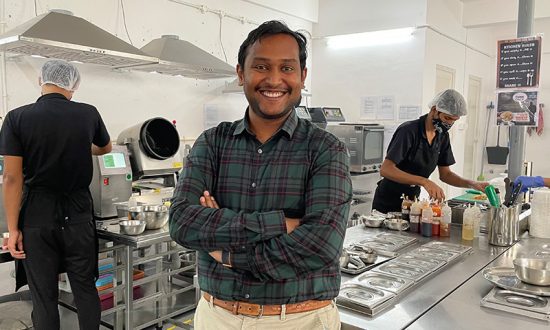A successful entrepreneur, an engineer at heart and a food enthusiast, Eshwar K Vikas is the CEO and co-founder of Mukunda Foods. Launched in 2012, Mukunda foods is a kitchen robotics brand which provides automation solutions for cloud kitchens and QSR brands. Under Eshwar’s supervision, his engineering team – the core of the organisation, started its expedition to seek solutions and pick everyday technology to give birth to this revolutionary concept of automated machines for cooking and preparing dishes without human intervention. Eshwar’s perseverance and dedication has led it to make its own mark in the food industry while the brand strives to completely transform the sector.
Past two years have been challenging for the food businesses, especially with constant changing restrictions and changing consumer behaviour. It was difficult for many businesses to survive, but some were agile enough to make pragmatic changes and sail through the tough times. As a result, the industry is already showing the signs of revival; we can already see many new brands joining the space, existing brands spreading their wings to new geographies and cloud kitchens raising funds.
Although these signs reflect recovery from the disruption, still many brands often go wrong on the fundamentals of business, i.e. food-taste consistency, and at times it’s a deal-breaker, especially for the cloud kitchens. A great service, calm ambience and convenient packaging surely add to the index of the happy customer, but nothing can replace the value of exquisite but consistent flavours. Brands and their chefs spend time, energy and resources to develop their signature recipes. But when it comes to replicating these recipes, they face a serious challenge of training the staff at the outlet level, making sure the SOP is followed without deviations.
This is where technologies like kitchen automation at the outlet level come into the picture. These automate the manual efforts for a skilled cooking process such as stirring, tossing, kneading, frying, heat temperature control etc. This leads to a significantly reduced possibility of compromised food taste consistency and easy scalability since the dependability on skilled labour goes down with minimum training efforts and monitoring.
Once a food brand has a perfect recipe and technology to replicate it well, this combination also helps on multiple fronts to make food brands successful.
Decrease in operations cost
Once the appropriate apparatus is set up according to business requirements, the kitchen can operate theoretically indefinitely and with minimal supervision. If put in a contrast with how a conventional kitchen operates, one shall observe that when someone from the staff goes on a holiday, there is always a fear of not serving a good meal. Every time you develop a new recipe, you have to invest time and money in training the staff.
Whereas a conventional kitchen requires high maintenance and a lot of regular planning, a technologically-enhanced kitchen can operate almost autonomously and efficiently, thereby saving tons on operational costs.
Greater control over how the food tastes
Each consumer has a unique appetite and sense of taste. For example, people in South India have higher chilli tolerance than those in East India. To cater to such patterns, a smart kitchen can determine the right proportion of ingredients according to the consumer more intelligibly than a human can. This also offers more flexibility in maintaining the flavour profile of dishes that could be too complex to prepare in cooking methods, ingredients, timing, etc. This will result in consistency, hence increasing brand value.
Less reliance on skilled manpower
The chef of a food brand is always worried about recipes being followed to T. With automation in the kitchen, a chef’s recipe doesn’t suffer from such unwanted uncertainties. Moreover, with cloud service providers guaranteeing near 100% availability, a smart kitchen will never go out of operations, be it a weekday or Christmas. Businesses will benefit by serving people when conventional kitchens are closed.
Less wastage:
Usually, wastage for a food business goes upto 2% of total revenue, and there isn’t much that the business owner can do about it in a traditional setup. However, with automations, the wastage goes almost 0 since there is no under or overcooking or deviation in an SOP.
IoT extendable
The greatest benefit of having automation is when one has IOT enabled machines. The machines will be in the purview of the Internet of Things. With a click of a button, a new recipe can be broadcasted to all the kitchens a business operates, no matter the geographical location. A business operating a chain of kitchens or restaurants can keep a check on all of them and their operations at once.
Customer satisfaction
Getting things done on time and up to the standards are always stressful to many food brands. With kitchen robotics, you can automate the recipe as per your SOPs and make sure your customers are not compromising the taste and quality of food.
This further represents how seamlessly fusing fine flavours with technology will result in a revolutionary outcome for the food industry. Creating an upward spiral of growth, technology is the tool for a flourishing present and a prosperous future for the food sector.


